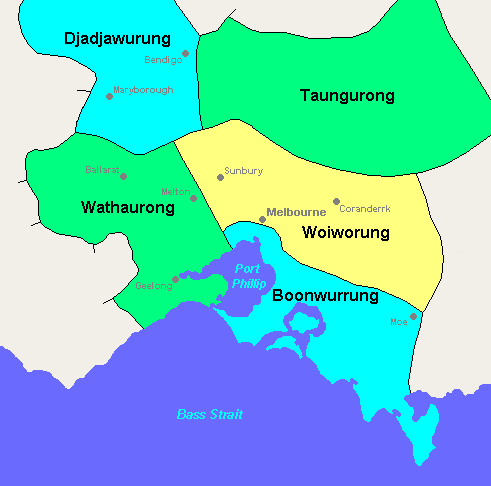Kulin People on:
[Wikipedia]
[Google]
[Amazon]
 The Kulin nation is an alliance of five Aboriginal nations in the south of Australia - up into the
The Kulin nation is an alliance of five Aboriginal nations in the south of Australia - up into the
Great Dividing Range
The Great Dividing Range, also known as the East Australian Cordillera or the Eastern Highlands, is a cordillera system in eastern Australia consisting of an expansive collection of mountain ranges, plateaus and rolling hills. It runs roughl ...
and the Loddon and Goulburn River
The Goulburn River, a major inland perennial river of the Goulburn Broken catchment, part of the Murray-Darling basin, is located in the Alpine, Northern Country/North Central, and Southern Riverina regions of the Australian state of Victor ...
valleys - which shares Culture and Language.
History
Before British colonisation, the tribes spoke five related languages. These languages are spoken by two groups: the eastern Kulin group of Woiwurrung–Taungurung,Boonwurrung
The Boonwurrung, also spelt Bunurong or Bun wurrung, are an Aboriginal people of the Kulin nation, who are the traditional owners of the land from the Werribee River to Wilsons Promontory in the Australian state of Victoria. Their territory ...
and Ngurai-illam-wurrung; and the western language group of just Wadawurrung.
The central Victoria area has been inhabited for an estimated 42,000 years before European settlement. At the time of British settlement in the 1830s, the collective populations of the Woiwurrung, Boonwurrung and Wadawurrung tribes of the Kulin nation was estimated to be under 20,000. The Kulin lived by fishing, cultivating murnong (also called yam daisy; ''Microseris
''Microseris'' is a genus of plants in the tribe Cichorieae within the family Asteraceae, plants that often called composites. They are native to North America, South America, Australia, and New Zealand.
Plants in the genus can either be annua ...
'') as well as hunting and gathering
A hunter-gatherer or forager is a human living in a community, or according to an ancestrally derived lifestyle, in which most or all food is obtained by foraging, that is, by gathering food from local naturally occurring sources, especially wi ...
, and made a sustainable living from the rich food sources of Port Phillip and the surrounding grassland
A grassland is an area where the vegetation is dominance (ecology), dominated by grasses (Poaceae). However, sedge (Cyperaceae) and rush (Juncaceae) can also be found along with variable proportions of legumes such as clover, and other Herbaceo ...
s.
Due to the upheaval and disturbances from British settlement from the 1830s on, there is limited physical evidence of the Kulin peoples' collective past. However, there is a small number of registered sites of cultural and spiritual significance in the Melbourne
Melbourne ( , ; Boonwurrung language, Boonwurrung/ or ) is the List of Australian capital cities, capital and List of cities in Australia by population, most populous city of the States and territories of Australia, Australian state of Victori ...
area.
People
* Woiwurrung (Woy-wur-rung) – theWurundjeri
The Wurundjeri people are an Aboriginal peoples, Aboriginal people of the Woiwurrung language, Woiwurrung language group, in the Kulin nation. They are the traditional owners of the Yarra River Valley, covering much of the present location of ...
people
* Boonwurrung – the Boonwurrung
The Boonwurrung, also spelt Bunurong or Bun wurrung, are an Aboriginal people of the Kulin nation, who are the traditional owners of the land from the Werribee River to Wilsons Promontory in the Australian state of Victoria. Their territory ...
people
* Wathaurong (Wath-er-rung) – the Wathaurong people
* Taungurung (Tung-ger-rung) – the Taungurung people
* Dja Dja Wurrung (Jar-Jar-Wur-rung) – the Djadjawurrung or Djaara people
At certain times of the year, these nations would meet at Yarra Falls to settle disputes, to trade, and to hold corroborees.
Diplomacy
When foreign people passed through or were invited onto tribal lands, the ceremony of tanderrum – freedom of the bush – was performed. This was intended to allow for safe passage and temporary access and use of land and resources by foreign people. It was a diplomatic rite involving the landholder's hospitality and a ritual exchange of gifts.Notes
Citations
Bibliography
* * * * * * *Further reading
* * * {{authority control Aboriginal peoples of Victoria (state) Kulin nation